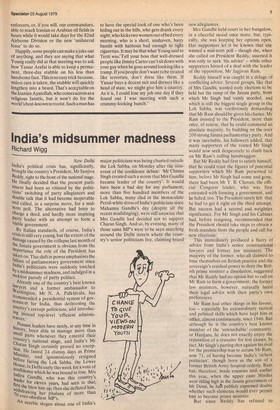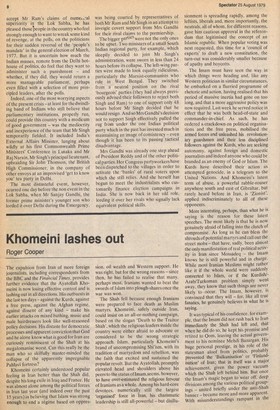India's midsummer madness
Richard Wigg
New Delhi India's political crisis has, significantly, brought the country's President, Mr Sanjiva Reddy, right to the front of the national stage. He finally decided that the present parliament had been so vitiated by the politicians' switching of party allegiances and double talk that it had become inoperable and called, in a surprise move, for a midterm poll. The alternative had been to Charge a third, and hardly more inspiring Party leader with an attempt to form a viable government.
,By Italian standards, of course, India's crisis is still very young, but the extent of the damage caused by the collapse last month of t, he Janata government is obvious from the Importance the role of the President has taken on, This shift in power emphasises the failure of parliamentary government since by politicians were suddenly touched uY a midsummer madness, and indulged in a reckless parody of party politics, , Already one of the country's best known lawyers and a former ambassador to Washington, Mr N. A. Palkhivala, has reomnriended a presidential system of government for India, thus dethroning the Country's corrupt politicians, and introduc ing instead top-level 'efficient administrators: Peasant leaders have rarely, at any time in history, been able to manage more than "mall parts whenever they entered their c_ountry's national stage, and India's Mr tt=haran Singh certainly proved no exception. He lasted 24 clumsy days as Prime b mister, and ignominiously resigned House, facing the Lok Sabha, the Lower „rik/us e, in Delhi early this week for a vote of tonfidence which he was bound to lose. Mrs Indira Gandhi, who was this country's !Fader for eleven years, had seen to that; rirst she blew him up, then she deflated him, Withdrawing her phalanx of more than fu ever-obedient MP's. An acerbic slogan about one of India's major politicians was being chanted outside the Lok Sabha, on Monday after the nonevent of the confidence debate: 'Mr Charan Singh created such a storm that Mrs Gandhi became leader of the country'. It would have been a bad day for any parliament; more than five hundred members of the Lok Sabha, many clad in the immaculate Persil-white dress of India's politicians since Mahatma Gandhi's day (despite all the recent mudslinging), were still unaware that Mrs Gandhi had decided not to support Charan Singh. And so, by evening, many of those same MP's were to be seen marching around the Delhi streets where the country's senior politicians live, claiming brand new allegiances.
Mrs Gandhi held court in her bungalow, in a cheerful mood once more, but, typically, she was keeping her options open. Her supporters let it be known that she wanted a mid-term poll — though she, when she called on President Reddy, asserted it was only to seek 'his advice' — while.other supporters hinted of a deal with the leader of the opposition, Mr Jagjivan Ram.
Reddy himself was caught in a deluge of conflicting advice. Several groups, like that of Mrs Gandhi, wanted early elections to be held but the rump of the Janata party, from which Mr Singh had vainly seceded, and which is still the biggest single group in the Lok Sabha, was vociferously demanding that Mr Ram should be given his chance. Mr Ram insisted to the President, more than mice, of course, that he could command an absolute majority, by building on the over 200 strong Janata parliamentary party. And it was inevitable, his followers added, that many supporters of the routed Mr Singh would now seek desperately to climb back on Mr Ram's rolling bandvvaggon.
But Mr Reddy had first to satisfy himself, that he could trust the figures of potential supporters which Mr Ram presented to him; before Mr Singh had come and gone, there had been Mr Y. B. Chavan, the official Congress leader, who was first. entrusted with forming a government, and be failed, too. The President surely felt that he had to get it right on the third attempt. But success had a second and weightier significance. For Mr Singh and his Cabinet had, before resigning, recommended that the President should take steps to obtain a fresh mandate from the people and call for new e I ect ions.
This immediately produced a flurry of advice from India's senior constitutional lawyers and former law ministers. The majority of the former, who all claimed to base themselves on British practice and the sovereign's residual power to deny the British prime minister a dissolution, suggested that Mr Reddy had no option but to call on Mr Rain to form a government; the former law ministers, however, naturally laced their legal advice with their party's own preferences.
Mr Ram had other things in his favour, too — especially his extraordinary tactical and political skills which have kept him in office, almost continuously, since 1946. But although he is the country's best known member of the 'untouchable' community, or Harijans, he does not exactly enjoy the reputation of a crusader for lost causes. In fact, Mr Singh's parting shot against his rival for the premiership was to accuse Mr Ram, now 7 I, of having become India's 'richest politician', though born as the son of a former British Army hospital orderly. Ram has, therefore, made enemies and, .earlier this year, when the upper caste Hindus were riding high in the Janata government of Mr Desai, he hat publicly expressed doubts whether such elements would ever permit him to become prime minister.
But since Reddy has refused to accept Mr Ram's claims of numei..-al superiority in thethe Lok Sabha, he has pleased those people in the country who feel strongly enough to want to wreak some kind of revenge, at the polls, on the politicians for their sudden reversal of the 'people's mandate' in the general election of March, 1977. But it is uncertain how much the Indian masses, remote from the Delhi hothouse of politics, do feel that they want to administer such a punishment — and whether, if they did, they 'would return a more manageable parliament, perhaps even filled with a selection of more principled leaders, after the polls.
Indeed, one of the most worrying aspects of the present crisis —at least for the dwindling band of Indians who still believe that parliamentary institutions, properly run, could provide this country with a modicum of good government — was the mediocrity and inexperience of the team that Mr Singh temporarily fielded. It included India's External Affairs Minister, lunging about wildly at his first Commonwealth Prime Ministers' Conference in Lusaka and Mr Raj Narain, Mr Singh's principal lieutenant, upbraiding Sir John Thomson, thd British High Commissioner, in the company of other envoys at an improvised 'get to know you' tea party in Delhi.
The most distasteful event, however, ocurred one day before the non event in the Lok Sabha, when Mr Sanjay Gandhi, the former prime minister's younger son who lorded it over Delhi during the Emergency, was being courted by representatives of both Mr Ram and Mr Singh in an attempt to inveigle covert support from Mrs Gandhi for their rival claims to the premiership. The bigger parties were not the only ones to be upset. Two ministers of a small South Indian regional party, for example, which sleepily decided to join Mr Singh's administration, were sworn in less than 24 hours before its collapse. The left-wing parties were made to look equally ridiculous, particularly the Marxist-communists who rule in West Bengal. They switched from a neutral position on the rival 'bourgeois' parties (they had always previously advised their followers to reject both Singh and Ram) to one of support only 48 hours before Mr Singh decided that he would resign. And so Mrs Gandhi's decision not to support Singh effectively pulled the rug from under the one Indian political party which in the past has invested much in maintaining an image of consistency — even though it has been to its passing tactical disadvantage.
Mrs Gandhi was already one step ahead of President Reddy and of the other political parties. Her Congress partyworkers have been dispatched to the villages in order to activate the 'banks' of rural voters upon which she still relies. And she herself has begun to meet the industrialists who customarily finance election campaigns in India. She is now back in her old role, lording it over her rivals who signally lack equivalent political skills.































 Previous page
Previous page